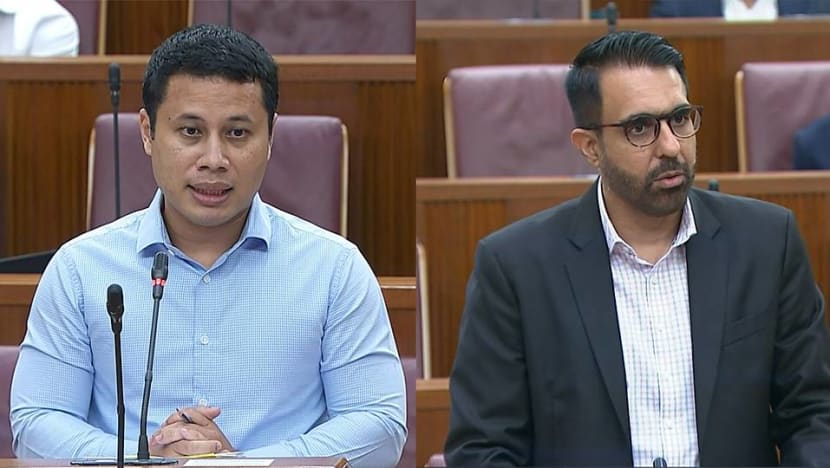Ethnic integration housing policy ‘necessary’ for harmony, says Desmond Lee as MPs debate need for racial policies

Minister for National Development Desmond Lee and Leader of the Opposition Pritam Singh debate the Ethnic Integration Policy in Parliament on Jul 5, 2021.
SINGAPORE: The Ethnic Integration Policy (EIP) remains an “important” part of combating racism and building racial harmony as it ensures “inclusive and diverse neighbourhoods”, Minister for National Development Desmond Lee said in Parliament on Monday (Jul 5).
“The EIP remains an important part of this effort. Left entirely to social and market forces, ethnic concentrations will start forming in different areas again,” said Mr Lee, even as he acknowledged the "pain points" of the policy such as difficulties for some owners looking to sell their flats.
Under the EIP, quotas are set for flats owned by each racial group in an HDB block or neighbourhood.
Mr Lee was responding to questions by Members of Parliament Cheryl Chan (PAP-East Coast) and Chong Kee Hiong (PAP-Bishan-Toa Payoh) about the relevance and necessity of the policy in today’s context.
The issue also drew comments from Leader of the Opposition Pritam Singh, who said that his Workers' Party (WP) aims to remove the EIP, but not before Singapore reaches a state of being "race neutral".
EIP TODAY
Without the EIP, there might be “ethnic concentrations”, noted Mr Lee in his speech.
There are many reasons why this might happen, even beyond “instinctive preferences” that people have to live near others from the same ethnicity, he said.
Some of these reasons include wanting to live near family members or that residents of certain ethnic groups may prefer neighbourhoods with a higher concentration of specific amenities and services or larger flat types.
While he said these are “completely understandable and reasonable preferences” on their own, these reasons could “inadvertently lead to segregation among the races”.
According to Mr Lee, nearly one-third of HDB blocks, and 14 per cent of HDB neighbourhoods, have reached one or more of the EIP limits today.
In some areas, like Bukit Merah, Pasir Ris and Woodlands, the limits are consistently reached across the years.
READ: Minorities bear 'direct and real' financial burden from Ethnic Integration Policy for public housing: Pritam Singh
READ: More appeals made for waiver of HDB's ethnic integration policy
“Just imagine how much more different ethnic groups would concentrate in different neighbourhoods if we did away with the EIP and how much harder it would then become to promote mixing and understanding across ethnic groups (at home),” he said.
While he acknowledged that living in close proximity to someone of a different ethnic group, culture or religion does not guarantee understanding, he said that the EIP remains “critical, because so much of our lives, and our children’s lives, revolve around our homes and our neighbourhoods”.
“If we don’t live with one another, it makes it much harder to empathise with other communities and understand the challenges they face, and much easier to stereotype or assume the worst of those who are different from us. This is a recipe for mutual mistrust and intolerance,” he said.
EIP’S PAIN POINTS
Nevertheless, Mr Lee recognised that the EIP is “an intrusive social policy” as it acts against “very powerful socio-economic forces”.
Some “rough edges” include sellers of other ethnicities unable to sell to buyers of a certain ethnic group once the EIP is reached for that group.
“With a smaller pool of eligible buyers, sellers may have to lower their asking price or take longer to sell their flat,” he said.
While this happens across all races, Mr Lee found that sellers from minority races tended to make more appeals, as Chinese buyers form a larger proportion of the market and the impact on non-Chinese sellers is larger when Chinese EIP limits are reached.
Mr Lee said a buyer from an eligible minority race would benefit from a lower resale price, and would be less affected if and when they sold their flat in the future, but he understood why affected sellers felt "aggrieved”.
To address these concerns, HDB exercises flexibility for EIP-constrained owners on a case-by-case basis, he said.
He added that successful EIP-related appeals rose from 14 per cent in 2018 to 21 per cent in 2020.
“However, whenever HDB waives EIP limits to address its impact on certain households, it’s mindful that this may lead to even higher imbalances in the concentrations of certain ethnic groups in some areas,” he said.
But ultimately, Mr Lee said the EIP has “an essential place” to protect and promote racial harmony, and that we should keep in mind the “larger social objective” behind the EIP.
REVISITING EIP ABOUT BUILDING "RACE NEUTRAL" SOCIETY: WP
In response to Mr Lee, Mr Singh asked whether the Government had details on the annual breakdown by ethnic groups of all HDB neighbourhoods both new and old from 1989.
He also asked whether HDB could exercise “greater flexibility” at the neighbourhood level to loosen the EIP criteria as a compromise or remove precinct and block quotas to help ethnic groups who have been affected by the policy.
Addressing Mr Singh’s concerns, Mr Lee brought up the WP's manifesto, which he described as “unequivocally” stating that people should be able to live wherever they want through abolishing the EIP, as racial harmony in Singapore would not be affected after more than 50 years of nation-building.
“We take a very different view to (the WP),” said Mr Lee in response, noting incidents over the years that remind residents to continue working at racial harmony.
“Never rest on our laurels that we can afford to take away mechanisms that are in place through the wisdom of the generations to keep our society where it is today.”
Mr Lee also reiterated that HDB is “very judicious” in looking at appeals to waive EIP limits for individual cases, otherwise “the lessons that we learnt will all unravel”.
Mr Singh reiterated that his call for a review of the EIP is “undergirded by the frustration of ethnic minorities who cannot sell their flats”.
“Is the EIP the only policy among a whole gamut of policies that the Government has to encourage racial integration?” he said.
“It has to be revisited in the context of, and not limited to, a larger national conversation on race relations in Singapore today … and what it means to be Singaporean," he added.
“The current policy, as it stands, has a larger impact on minorities, penalising them in the pocket when they have to sell their flat … This may perversely interact with the stated objective of the policy of racial harmony, thereby breeding resentment amongst those who are affected by the policy.”
Ultimately, Mr Singh focused on the philosophy of aiming towards a “race neutral society”, adding that the EIP should not “become a barrier to that vision”.
He also acknowledged that the Government’s reasons for retaining the EIP “are not totally illegitimate”.
“But how do we move forward with the EIP, knowing that there are minority communities, and even the Chinese community, which are affected by it. Is there a better way forward?”
Joining the debate, Leader of the House Indranee Rajah then asked Mr Singh whether the WP’s stance remains that the Government should abolish the EIP, or to keep the EIP but “improve it and ameliorate the impact on minorities”.
In response, Mr Singh said: "We still aim to remove it, but until we get there, we have to ... even out the rough edges as much as possible.
“At some point, I hope within our generation, we reach that place where we are race neutral. Doesn’t mean that ... sometimes things don’t bubble over, but there are more important things that remind us that we’re Singaporean and we have to look beyond our skin colour."
Following Mr Singh’s response, Mr Lee said he noted what was the WP’s "clear change in political position" from 2006.
“In 2006, and all the way until last year, the WP’s position is that we’ve already reached a level of multiculturalism and therefore unequivocally called for, in 2006, election after election, the immediate abolition of the EIP,” Mr Lee said.
“The WP’s position today, in 2021, is that we still need the EIP (as we) work towards a race-blind society. … That is a clear change in political position. I thank the member for that.”
IMPORTANCE OF INTEGRATED HOUSING
Their exchange on the policy saw the extension of question time in Parliament by more than an hour.
Senior Minister Teo Chee Hean rose to speak, asking Mr Singh if the Government should abolish the EIP and allow ethnic enclaves to form, before trying to correct problems when they arise.
The measures the Government are taking today are to avoid such situations, said Mr Teo, asking if Singaporeans were more likely to learn how to live with each other by living in an “integrated way” or in “segregated estates”.
He added: “And also, are we more likely to level everyone up if we are able to identify the issues that each of the communities in Singapore may face and therefore have more targeted programmes for them, or to ignore the different which the Leader of the Opposition says we should be race blind or race neutral and then just treat everybody as though they are exactly the same?”
Citing Mr Singh's comment that having more members of opposition in Parliament would lead to a better outcome, Mr Teo asked Mr Singh if he agreed that “these are matters of great sensitivity and have to be handled with great sensitivity, rather than be exploited for political purposes”.
In response, Mr Singh denied that WP was using race for political purposes.
“In terms of the series of hypotheticals that the minister put out, I think moving from one extreme to the other extreme is probably not the best policy approach, hence the earlier exchange we had about evolving the EIP to suit the needs of this current generation,” Mr Singh said, in reference to his reply to Mr Lee.
He added that philosophically, both the WP and PAP are trying to “move towards a race neutral society”.
Mr Teo then stressed the difference between philosophy and methods.
“The philosophy we can agree on. We all want a multi-racial Singapore,” he said. However, he said that Singapore is more likely to get there with the EIP, rather than the WP’s proposal of abolishing it.
“Are we more likely to achieve an integrated Singapore by having integrated housing, or to abolish the EIP as the Workers’ Party would propose today, and have segregated housing? And then how do we learn how to live together again?”
RELEVANCE OF CMIO
MPs also raised questions on other aspects of race and religion, with Mr Sitoh Yih Pin (PAP-Potong Pasir) asking about the relevance of the Government’s CMIO (Chinese, Malay, Indian and Others) model today.
In response, Minister for Culture, Community and Youth Edwin Tong noted that the WP had on several occasions questioned the continued relevance of the CMIO model and had called for it to be removed.
“But at the same time, at almost every parliamentary sitting, there are many numbers of PQs (parliamentary questions) which focus on individual specific races looking at programmes, outcomes, assistance,” he said, referencing questions from WP MPs on specific race categories.
READ: Students who experience discrimination 'should not hesitate' to provide feedback to schools: Maliki Osman
READ: Differences across race must be accepted and approached ‘constructively’: Maliki Osman
“I am not citing these to suggest that these questions ought not to be answered,” said Mr Tong, adding that the point was that both sides of the House “realise that it is important to look at these outcomes by segments of society”.
“And it is only if you have the CMIO classification and breakdown that you will be able to track performance of relative segments of society, to gauge the outcomes and to gauge ourselves to the efficacy and outcomes of these programmes that we have in place,” he said.
Speaking after Mr Tong, Mr Singh said that the WP “operates on terms dictated by the Government which wins the mandate at the elections”.
He added that the WP wanted to “level everybody up so that no race feels that the government policy doesn’t reach out to them in a way which brings us to the destination … of a race neutral society”.
While he noted the importance of knowing that government policy is improving outcomes for specific communities, he suggested that immigration after 1990 has “changed the complexion of Singapore society”.
“Are we just looking at CMIO now or is there something a little bit more complicated in Singapore that we need to look into?” he said.
He added: "I do believe that there is a shift in Singapore society, a fundamental shift, and it would be useful to know if the CMIO model needs to evolve."














